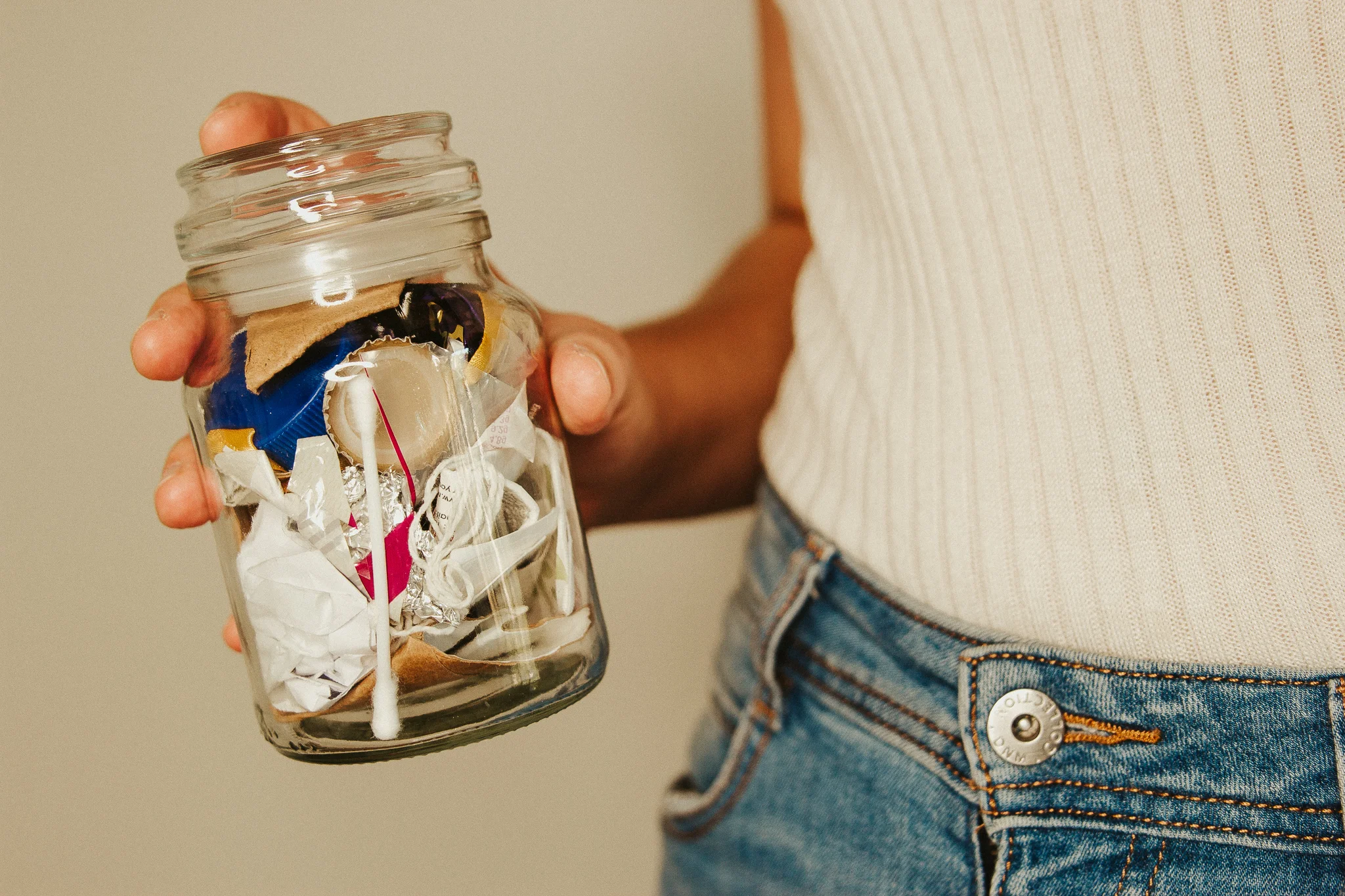Sustainable Living: 5 Reasons Why I'll Never Be Zero Waste
Do you see the photo above? That’s an example of the amount of waste I could produce… in approximately one day. Yeppp, you read that right, only one day. I’m sure you imagined an environmental management and sustainability graduate and eco-friendly living blogger to make absolutely no waste all year round, but in fact, my passions, educational background and values are the reasons why I still produce a fair amount of rubbish. Everything in my daily “trash jar” has been made based on my own personal circumstances, the situation I was faced with or what I believe to be the most sustainable choice or purchase to make.
I'll start by saying I don't produce this amount of rubbish everyday - as I don't always go shopping, finish a tube of concealer and buy a block of chocolate all at the same time. Not that I should have to justify myself, but that's just what us greenies do. We constantly feel, or are made to feel, guilty about what and how much goes into our bins. Don't get me wrong, I am a huge advocate for reducing waste, whether that be at home or while travelling, as it is an extremely important part of sustainable living. I’m proud to say the amount of waste I make has decreased dramatically since taking part in Plastic Free July last year and most of what I still produce, is recyclable. However, I don’t think I will ever fully adopt a zero waste lifestyle, even if I never leave the house without my reusables and always make an effort to share zero waste and plastic free products, tips and solutions. Because unfortunately, we all have an impact and make waste, whether that’s directly or indirectly.
Firstly, if reducing your waste and plastic-free living is what you're most passionate about, then there is absolutely nothing wrong with dedicating yourself to such a urgent and devastating problem. However, my approach to sustainability is pragmatic. I believe there is many different things we can do to make a difference and reducing waste is only one element of sustainable and eco-friendly living. With Project 3 P, I aim to create widespread awareness and encourage everyone, greenie or not, to make small positive changes. We can never make a 100% sustainable choice and when we think we are doing the right thing, we are often still compromising one issue for another. But I believe just being conscious about the decisions and purchases we make is enough and we must accept everyone's values, passions and priorities are different. I am aware “zero waste” is a journey, but I’m about to share with you the reasons why I believe it’s totally okay to be an imperfect environmentalist.
Green guilt & the idea of being perfect
Unfortunately, environmental and sustainable living movements are often portrayed as extreme or unattainable. There is this idea that if you’re not perfect, you’re not doing enough and although this is not what is intended, for those people who are new or interested in reducing their waste or making greener lifestyle choices, this can actually cause them to feel overwhelmed and unmotivated. The term “zero waste” actually comes with a certain benchmark, and although it’s great to set goals, producing no waste at all, is very unrealistic. With this ideology, also come green guilt and judgement. According to a recent study, 92% of 18-55 year olds say that the environment is important to them, but more than a quarter (26%) say they exaggerate their environmental credentials to alleviate green guilt. And even though direct shaming and criticism rarely occurs in Facebook groups or between accounts on Instagram within the green living and conscious community, it is still inevitably felt – either from others or internally.
If you’ve landed on my blog, I’m sure you’re already aware of the increasing news and awareness surrounding our unsustainable use of single-use plastics. Although no one is personally pointing the finger at me, I always catch myself feeling incredibly guilty for buying certain vegetables that aren’t available to me package free or using make up. But it’s important to remember that there is not a “one size fits all” approach to sustainable living. Lots of factors such as affordability, access and lifestyle pay an important role in the choices and purchases we make. I think it’s important to be open, honest and raw about our journey and learnings and understand we don’t need to justify our decisions or mistakes. It’s also important to focus on the positives, the good you are creating and doing your best, rather than your negative impact, slip ups, and unavoidable failures.
30 Instagram Post Ideas for your Eco-friendly Business
DOWNLOAD YOUR FREE CHEAT SHEET NOW!
Creating waste can be unavoidable
Just being human and existing on this planet means we have an environmental impact. Even when we try our hardest to make responsible and conscious decisions, there’s always something we can do better or greener. That doesn’t necessarily mean our efforts are no longer making a difference (one decision does not counteract another) but it’s important to be aware of indirect waste as well. Because even the products we purchase from bulk food stores have come into contact with plastic at some stage in their lifecycle. Whether that plastic was used to transport the products through rural villages in South East Asia or used inside a cardboard box for shipping before it is poured into the scoop bins, it’s still waste, and it still existed, regardless of whether it went into our home rubbish bins or not.
When travelling overseas, it’s often harder stick to a sustainable and low impact lifestyle. Although it’s totally possible, it takes some serious dedication and you often have to plan your travels around green and eco travel destinations – eateries and stores included. It’s also super difficult to refuse single-use plastics when you’re not familiar with a place or the local language.
Zero waste is not always the most sustainable option
Although plastic pollution and the amount of household waste we produce is an extremely hot topic at the moment, it isn’t the only environmental issue our planet faces. But it is the issue people living in urban communities see and feel the most. And it’s definitely the issue they feel they have the most power to can change. But it is very easy to forget that sustainability is extremely complex and our choices are never perfect.
Focusing solely on zero waste, means we are prioritising reducing our waste over other issues. But personally, from a sustainability perspective, other impacts of my lifestyle are more important. Don’t get me wrong, I often try to avoid products wrapped in plastic, but sometimes, I would rather choose a certain brand or the production of a product, over its waste element. For example, if there was a choice between organic raw honey produced by a local beekeeper in a plastic container and honey supplied in a glass jar by an unsustainable company, I’ll always choose the first option. This is because I believe making this purchase has more of an positive outcome than trying to reduce my plastic consumption.
30 Instagram Post Ideas for your Eco-friendly Business
DOWNLOAD YOUR FREE CHEAT SHEET NOW!
Zero waste living relies heavily on time, money and access
Although many people say zero waste living is cheaper, which is most likely is in the long term, I struggle to even afford package free nuts due to my uni student budget. Buying in bulk and zero waste living also means you have to dedicate a lot of time to DIY. Although I love to make my own homemade granola, I can't always fit those couple hours into my schedule.
Many cities and nearby beach locations have quite easy access to zero waste foods and fresh produce. But this is not the case for all places, especially not where I live - in the suburbs. As I mentioned in my blog post The Imperfect Environmentalist: Doing What You Can Is Enough, it takes me over half an hour to drive to my closest bulk food store and farmers market. And if we consider the emissions released from driving long distances, then that’s another issue all together. For me personally, zero waste living can be totally unrealistic and inaccessible, when you don’t have access to certain places or resources.
Organic and plant based foods often comes in plastic packaging
Even though eating organic produce or maintaining a vegetarian/vegan has been proven to reduce our ecological footprints, the majority of the time, these products come in a single-use plastic package - and they often aren’t found in bulk either. I’ve been vegetarian for nearly 4 years, due to both preference and ethical reasons. This means, in order for me to eat a healthy and well balanced diet (with an overall lesser environmental impact) and to live in alignment with my values, I sometimes have to purchase plant based foods, such as veggie burgers and tofu, in plastic.
RELATED: 7 Things You Should Be Doing to Save the Environment
When I finished writing this blog post, I actually felt a lot better about not being 100% zero waste. It has allowed me to accept that waste isn’t always my priority and that sometimes, it’s okay to create rubbish if it was a justified decision. So, I hope it makes you feel better about your efforts too. I have also realised how important it is to effectively communicate sustainability issues. Communication plays a key role in building on emerging trends and helps to make sustainable living approachable and understandable. I've realised, by being the "green police", people (my friends, family and work colleges) actually get sick of me nagging them and constantly talking about all the negatives. So, I've decided to take a step back and reevaluating the way I communicate environmental problems and sustainable living practices, in hope to positively influence attitudes and behaviours.
30 Instagram Post Ideas for your Eco-friendly Business




